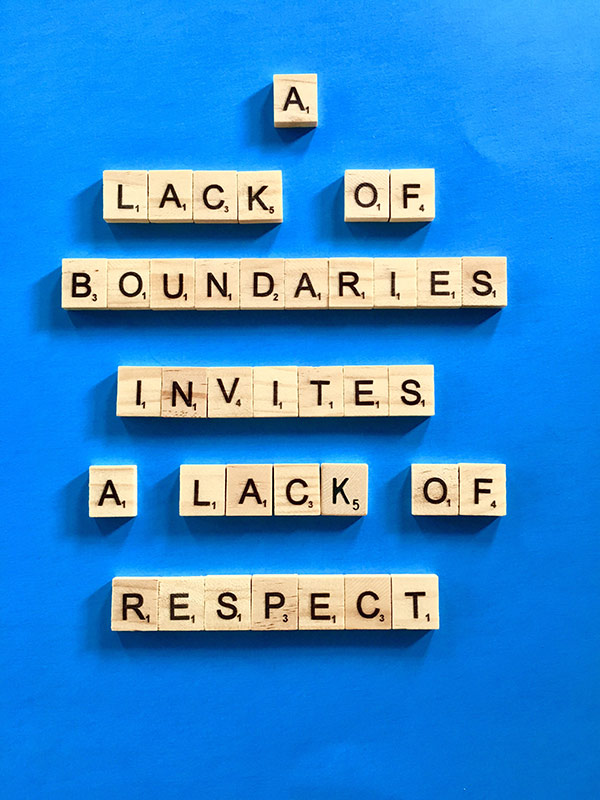
The entertainment industry has a lot to say about relationships but what about boundaries in relationships? Movies, books, TV shows and even musical lyrics provide a similar definition of love: love means that a partner can treat you however he or she wants, and because you love each other, you must always forgive.
The truth is, we all have boundaries. They can be as simple as the nicknames you are okay with your partner calling you or as intimate as what you are comfortable with in the bedroom. The foundation of a healthy relationship is when these limits are respected by both partners.
How To Maintain Healthy Boundaries In Relationships
Know Yourself
In order to be able to establish boundaries in relationships, you first have to know yourself and what makes you draw a line. Part of knowing yourself is to be self-aware, which means taking an honest look at yourself.
Acknowledge your feelings without judgment — you will find it difficult to identify a boundary if you believe that any of your needs are silly.
No feelings or emotions are “wrong” when you are being introspective. Everyone’s needs are different, and your needs deserve to be respected even if you feel that they differ from what society says is the norm.
Prioritize Self-Care
Another key to effective boundary-setting is making yourself a priority. It’s not as selfish as it sounds.
You may have heard that you can’t take care of others until you take care of yourself first, and this statement applies to establishing a boundary in your relationship as well.
Relationships involve two people. It isn’t healthy for only one partner to be making concessions in the relationship — you have a right to express your needs as well.
This doesn’t mean that you treat your needs as more important than your partner’s, but rather you understand that those needs are equally important as theirs.
Voice Your Concerns
As much as we might wish that we could, humans still have not figured out how to read minds. That means that another vital component to setting a healthy boundary is calling attention to that boundary out loud.
Don’t assume that your body language does all the talking, as some individuals are less adept at reading nonverbal cues than others. Voicing that boundary eliminates this possible confusion by notifying your partner of a boundary that you don’t want to be crossed and how they can avoid crossing it in the future.
The best idea is to have a discussion about limits before anyone has the opportunity to cross a boundary by accident, but it’s never too late to have this discussion with your partner.
Don’t Attack
When having this discussion with your partner, avoid an aggressive stance (i.e., name-calling, raised voice) or accusatory language (i.e., “You know I hate it when you call me X!”).
If you have never had this sort of discussion before, then your partner may genuinely not know that they have crossed a boundary. Attacking puts the other person on the defensive, which isn’t conducive to compassionate listening and understanding.
If you have a healthy relationship, then your partner will already feel terrible for crossing a boundary and will want to work with you to ensure that they don’t do it again.

Be Direct
Your conversation on setting boundaries in relationships will benefit from direct language. These types of discussions can be difficult and confusing at times, so you don’t want to contribute to any possible misunderstandings by using vague language and euphemisms.
State your boundary, explain why it’s an issue for you if you feel that it’s necessary (though explanations aren’t a requirement if you aren’t inclined to give one), and ensure that your partner understands how to avoid crossing that boundary.
Be honest with your partner about your needs and don’t sugarcoat. In short, say what you mean and mean what you say.
Avoid Absolutes
One final aspect of language to consider when speaking with your partner is the need to avoid absolutes such as “always” and “never” (i.e., “You always consider your needs above my own” or “You never take out the trash when I ask you to”).
Life rarely works in absolutes, so your partner will likely find it unfair when you use these words. If your partner has ever crossed a boundary, be specific about when the incident (or incidents) occurred and how it made you feel.
Being specific instead of using absolutes helps your partner better understand your boundary so that you can maintain it in the future.
Recognize That Your Partner Has Boundaries Too
As mentioned before, relationships go both ways. You both have needs, you both have limits, and you both deserve to have those respected. When having this discussion with your partner, make sure to also create space for them to voice their own concerns as well.
If you have never had this kind of discussion before, you may be surprised by what you hear, so keep an open mind as your partner speaks and respond with the respect and understanding that you expected from your partner.
With mutual respect, you are well on your way to maintaining the healthy boundaries that you have set.
Check in with Each Other
Boundary-setting doesn’t end after just one conversation. Once the limits have been established, you and your partner should regularly check in with each other to make sure that you both feel that your needs are being met and respected.
If that isn’t the case, then you will need to have another discussion.
In short, a healthy relationship requires boundary-setting. Establishing and maintaining a healthy boundary can be complicated, but if you take away nothing else from this list, remember this: you deserve to be respected.
Related Posts
- Healthy and Happy Gut Equals a Happy Life
We need to talk about a Healthy Gut! There are many ways that we have…
- Signs of a Toxic Relationship and How To Leave
Signs of a Toxic relationship are a serious problem for many people in this world. It…
- Addictive Personality Disorder
The last decade has seen an increase in reported cases of substance abuse. Behavioral addictions…
